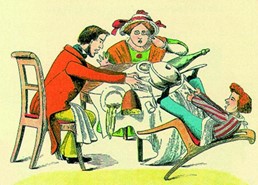Author Susan Yarney is a Neurodevelopmental Paediatrician, specialising in ADHD, who works for the National Health Service.
When we hear of students with a diagnosis of ’ADHD’ how do we react?
‘Can I tell you about ADHD?’ is a very helpful read as we endeavour to understand and accept all WHS students, in whatever way they present themselves.
Having never heard of ADHD from my own school days and teaching training, I was immediately struck by the date of a poem printed at the start of the book (1845) written by Heinrich Hoffman.[1]
Looking into this poem more I was shocked to read on a storynory page – “Fidgety Philip is another horrid creature from the poem Shock-Headed Peter by Heinrich Hoffmann”..[2] With such an attitude how can a professional nurture young people of all dispositions? I know my colleagues would never think of a student in that way – but how can we understand ADHD better?
An article in the British Medical Journal[3] asks, ‘Could Fidgety Philipp be proof that ADHD is not a modern phenomenon?’ “According to a new study, Zappel-Philipp, a character in the 1846 children’s book Struwwelpeter, is probably the first written mention of attention-deficit/hyperactivity disorder (ADHD) by a psychiatrist.”[4]

Susan Yarney has written ‘Can I tell you about ADHD?’ for pupils themselves to read so they can understand themselves and the world better and find their voice in a world that may just be keen to label them as difficult – but it’s such a succinct and helpful guide for teachers and parents as well.
Being only 55 pages, it’s a very easy read and invaluable for gaining a better understanding. The book certainly encourages all to accept and know our students, and understand what activities they thrive on most, before we think about the label and indeed give further unspoken labels.
The book ends with 10 pages of very helpful ways friends, parents and teachers can help.
I hope you enjoy the book and gain a better insight into some of the students you teach.
Finally… see what you make of Heinrich Hoffman’s poem!
“Let
me see if Philip can
Be a little gentleman;
Let me see if he is able
To sit still for once at table:”
Thus Papa bade Phil behave;
And Mamma looked very grave.
But fidgety Phil,
He won’t sit still;
He wriggles,
And giggles,
And then, I declare,
Swings backwards and forwards,
And tilts up his chair,
Just like any rocking-horse-
“Philip! I am getting cross!”
See the naughty, restless child
Growing still more rude and wild,
Till his chair falls over quite.
Philip screams with all his might,
Catches at the cloth, but then
That makes matters worse again.
Down upon the ground they fall,
Glasses, plates, knives, forks, and all.
How Mamma did fret and frown,
When she saw them tumbling down!
And Papa made such a face!
Philip is in sad disgrace.
Where is Philip, where is he?
Fairly covered up you see!
Cloth and all are lying on him;
He has pulled down all upon him.
What a terrible to-do!
Dishes, glasses, snapped in two!
Here a knife, and there a fork!
Philip, this is cruel work.
Table all so bare, and ah!
Poor Papa, and poor Mamma
Look quire cross, and wonder how
They shall have their dinner now.”
By Heinrich Hoffmann
[1] https://en.wikipedia.org/wiki/Heinrich_Hoffmann_(author)
[2] https://www.storynory.com/fidgety-philip/
[3] 2004 Sep 18; 329(7467): 643. By Roger Dobson
[4] The book, written for his son by Dr Heinrich Hoffmann contains a series of short stories about a boy called Zappel-Philipp, which translates as Fidgety Philipp. In a study in European Psychiatry Dr Johannes Thome, professor of psychiatry at the University of Wales School of Medicine, Swansea, and co-author Kerri Jacobs say the character has all the symptoms of ADHD.

